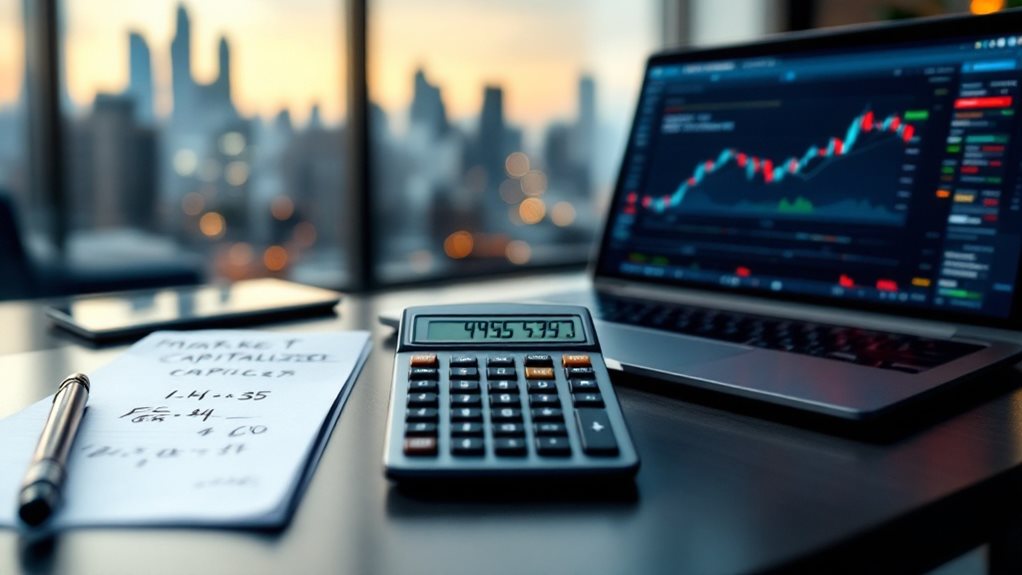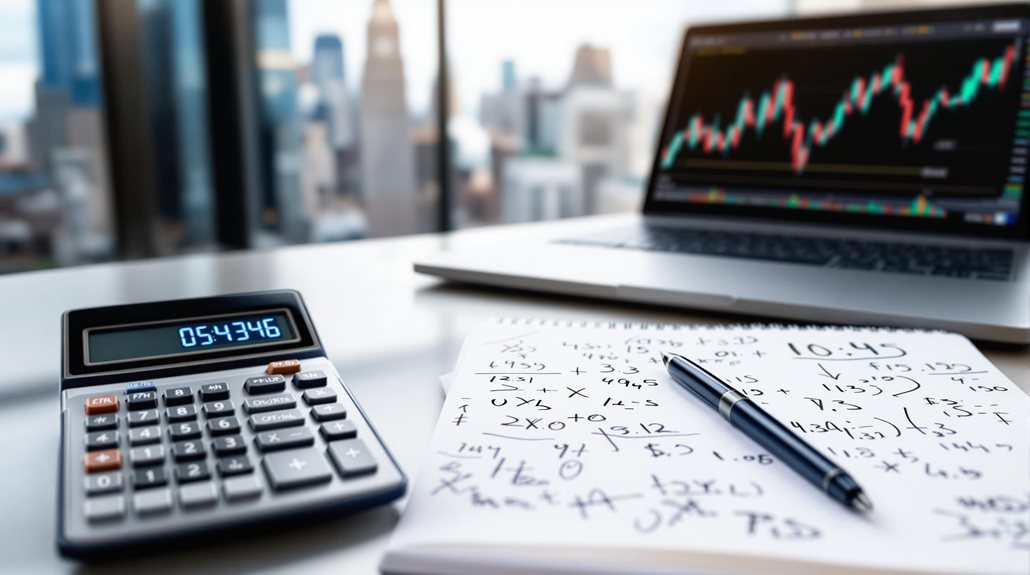Market capitalization is found by multiplying a company's current stock price by its total number of outstanding shares. For example, if a company has 1 million shares and its stock price is $50, the market cap would be $50 million. This calculation shows the total value of a publicly traded company at any given time. Private companies use a different method involving enterprise value and net debt. There's more to understand about how market cap affects investment decisions.

Market capitalization, often called "market cap," is a basic way to measure how much a publicly traded company is worth. It's calculated by multiplying a company's current stock price by its total number of outstanding shares. The stock price used in this calculation is typically the most recent closing price from the stock market. Large-cap stocks are considered some of the most stable investments. Market cap insights help investors make informed decisions about portfolio diversification.
When calculating market cap, it's important to include all classes of shares that a company has issued. Companies sometimes have different types of shares, and they all need to be counted. The calculation also uses what's called the "fully diluted" share count, which includes shares that could be created through things like stock options or convertible securities. Companies with market caps above $200 billion are considered mega-cap stocks.
While this method works well for public companies, there's a different way to figure out market cap for private companies. For these businesses, you can take the enterprise value and subtract the net debt. Net debt is calculated by taking all the company's debt and subtracting its cash and cash equivalents. This method helps show how much of the company's value belongs to the shareholders, not counting what's owed to lenders or preferred stockholders.
One thing to keep in mind is that market cap isn't a fixed number – it changes whenever the stock price moves up or down. This means a company's market cap can change considerably from one day to the next, even though nothing about the actual business has changed. Investment funds and unit trusts aren't included in market cap calculations since they're different types of investments.
While market cap is useful, it's not the only way to measure a company's worth. It might not show the true price someone would need to pay to buy the whole company, and it can be tricky to compare market caps of companies from different countries because of varying accounting rules. Enterprise value is another measurement that some people prefer because it includes other factors like debt and cash holdings.
The main advantage of market cap is that it's simple to calculate and understand. Anyone with access to a company's stock price and number of shares can figure it out.
However, it's worth remembering that this simplicity also means it doesn't tell the whole story about a company's value or financial health. It's just one piece of information among many that investors and analysts use to evaluate companies.
Frequently Asked Questions
Can Market Capitalization Predict a Company's Future Stock Performance?
Market capitalization can't reliably predict a company's future stock performance. While it's often used as one indicator, many other factors influence stock prices.
Large-cap companies tend to be more stable but might grow slowly, while small-cap companies can offer higher growth potential with more risk.
History shows that market cap alone isn't enough to forecast returns. Factors like earnings, industry trends, and economic conditions play important roles in stock performance.
How Often Does a Company's Market Capitalization Get Updated?
A company's market capitalization updates constantly during trading hours as stock prices change.
It's recalculated in real-time by automated systems and instantly displayed on financial websites. The official market cap is typically recorded at market close each trading day.
Corporate actions like stock splits, share buybacks, or new share issuances also trigger updates.
Major stock indices update their constituents' market caps periodically, with different schedules for different indices.
Why Do Some Companies Split Their Stocks Despite Unchanged Market Cap?
Companies split their stocks mainly to make shares more affordable for smaller investors.
While a split doesn't change the company's total value, it's like breaking a $20 bill into four $5 bills – you still have $20, but it's easier to spend.
Splits can make trading easier and boost stock liquidity.
It's also a way for companies to keep their share prices in line with similar companies in their industry.
What Causes Sudden Changes in a Company's Market Capitalization?
A company's market cap can change suddenly due to various factors.
Stock price changes are the main driver, often triggered by earnings reports, company news, or market sentiment. Major announcements like mergers or acquisitions can cause big swings.
Changes in the number of outstanding shares, through things like buybacks or new stock offerings, also affect market cap.
External events like economic shifts or industry disruptions can impact it too.
Do Stock Buybacks Significantly Impact a Company's Market Capitalization?
Stock buybacks don't automatically change a company's market cap in a major way.
When a company buys back shares, it reduces the number of shares while typically increasing the price per share. These effects tend to balance each other out.
However, buybacks can boost investor confidence and signal that management thinks the stock is undervalued, which might lead to higher share prices and market cap over time.





